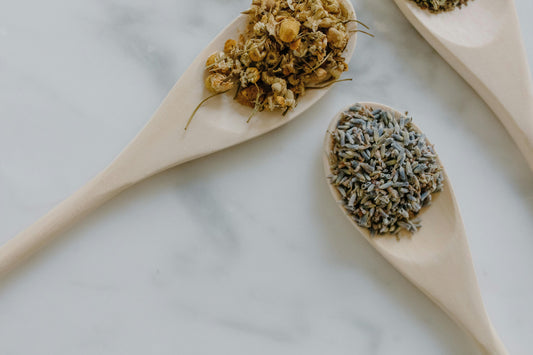Your hormones are the unsung heroes of keeping your body in check, regulating everything from your mood and metabolism to your sleep patterns and fertility. But it's all too easy for these chemical messengers to fall out of balance.
Mood swings, stubborn weight gain, relentless fatigue: Hormonal imbalances can wreak havoc on your well-being. But the power to restore harmony is within your grasp. Imagine waking up every morning feeling energized, focused, and in complete harmony with your body. Here are several ways to harmonize your hormones… naturally.
What Is a Hormone Imbalance?
A hormonal imbalance refers to a disruption in the equilibrium of hormones within your body. Hormones are chemical messengers that regulate various bodily functions, including metabolism, reproduction, mood, sleep, and more. Common hormonal imbalances affect:
- Anandamide: Known as the ‘bliss hormone’ it regulates mood, memory, appetite, sleep, and pain perception. Low levels contribute to depression, anxiety, and chronic pain.
- Cortisol: This ‘stress’ hormone is produced by the adrenal gland. High levels of cortisol are associated with anxiety, but moderate levels can improve attention and motivation.
- Dopamine: A ‘feel-good’ neurotransmitter regulating reward and motivation. It’s released in response to pleasurable stimuli, such as social interaction.
- Estrogen: This female hormone is produced in the ovaries. It regulates menstrual cycles, bone density, and sexual desire. Low levels of estrogen reduce libido, while excess estrogen increases the risk of breast cancer and men developing breast tissue.
- Oxytocin: The ‘love hormone’ is produced in the brain (hypothalamus) and is associated with bonding, trust, intimacy, and empathy. It’s released during physical touch (like hugging) and increases feelings of connection, while reducing stress.
- Phenylethylamine: Often referred to as the ‘new relationship hormone’ it is produced in the brain and regulates mood, motivation, and attention. It is associated with feelings of pleasure, euphoria, and happiness and released in response to pleasurable stimuli.
- Serotonin: This ‘feel-good’ neurotransmitter regulates mood and social behavior. Low levels of serotonin are linked to depression, anxiety, and social withdrawal, while increased levels improve mood and enhance social connectedness.
- Testosterone: This hormone is commonly associated with male sexuality, but it is also important for women's sexual health and well-being. Low levels of testosterone lead to decreased libido, sexual dysfunction, and a reduction in strength and stamina.
Causes of Hormone Imbalance
Hormonal imbalances can occur due to a variety of reasons, according to Medical News Today. One common cause is the body's inability to produce or regulate hormones properly. This can happen when certain endocrine glands, such as the thyroid or adrenal glands, become overactive or underactive, leading to an excess or deficiency of specific hormones.
Additionally, external factors like stress, poor nutrition, inadequate sleep, environmental toxins, and certain medications can disrupt the delicate hormonal balance.
Hormonal Imbalance Symptoms
When our hormones are out of whack, it can lead to a cascade of symptoms and health issues. From irregular menstrual cycles and infertility to weight gain, mood disorders, low energy levels, and skin problems, the effects of hormonal imbalances can be far-reaching for both males & females.
According to the Cleveland Clinic, symptoms can also include:
- Irregular menstrual cycles or absence of periods
- Mood swings, anxiety, or depression
- Fatigue and low energy levels
- Weight gain or difficulty losing weight
- Insomnia or disturbed sleep patterns
- Changes in appetite and food cravings
- Hair loss or thinning
- Skin issues such as acne or dryness
- Reduced libido or sexual dysfunction
- Digestive problems, including bloating or constipation
It’s important to note that this list isn’t exhaustive, and you may experience different symptoms depending on the specific hormonal imbalance you’re dealing with.
How to Naturally Balance Your Hormones
1. Eat an Anti-Inflammatory Diet
Consuming a diet rich in whole, nutrient-dense foods can help reduce inflammation in the body. Inflammation can disrupt hormonal balance, so incorporating anti-inflammatory foods like fruits, vegetables, healthy fats (such as omega-3 fatty acids), and essential minerals can support hormone regulation.
Certain nutrients, such as omega-3 fatty acids, magnesium, and iodine, may support hormone balance. However, it's important to talk to your doctor first to make sure they’re safe for you.
2. Avoid Endocrine Disruptors
Endocrine disruptors are chemicals found in certain plastics, pesticides, personal care products, and household items that can interfere with hormone function, according to the National Institute of Environmental Health Sciences.
Minimizing exposure to these substances by choosing natural and organic products and avoiding plastic containers and food packaging can help maintain hormonal balance.
3. Balance Blood Glucose Levels
Consistently elevated blood sugar levels can impact insulin and other hormones involved in metabolism. Consuming balanced meals with a combination of complex carbohydrates, healthy fats, and proteins, along with regular physical activity, can help regulate blood glucose levels and support hormone balance.
4. Detox and Cleanse
Doing a periodic detox or cleanse can aid in eliminating toxins that may disrupt hormonal balance. Even when you’re not doing a cleanse, staying hydrated, consuming fiber-rich foods, exercising regularly, and avoiding excessive alcohol and processed foods also help support the body's natural detoxification processes.
5. Improve Gut Health
A healthy gut microbiome is crucial for hormone regulation. Consuming nutrient-rich foods, eating fiber, managing stress, and avoiding excessive use of antibiotics can promote a healthy gut, positively impacting hormone balance.
6. Evaluate Medications and Birth Control
Some medications, including hormonal contraceptives, can influence hormone levels, per MedlinePlus. Talking to your doctor about potential alternatives or adjustments to medications or birth control methods that can help regulate hormonal health.
7. Practice Good Sleep Hygiene
You probably know that getting enough zzz’s each night can benefit your immune system and improve your mood. However, did you know that getting a good amount of sleep can do good for your hormone system as well?
When you don’t get enough sleep, your hormones may spike and drop or delay hormone production. Prioritize good sleep hygiene by establishing a regular sleep schedule, creating a relaxing bedtime routine, and optimizing your sleep environment to support hormone regulation. Aim to get 7 to 9 hours of sleep each night.
8. Address Emotional Health
Being chronically stressed significantly impacts your hormones, specifically cortisol. When cortisol is released due to stress, it leads the entire body to produce a response, including your hormone system. Chronic stress can impair the mechanisms your hormone system uses to get back to normal. It can also lead to higher sugar consumption, as eating is sometimes a coping mechanism.
Engaging in stress-reducing activities such as meditation, mindfulness, therapy, or engaging in hobbies can help support emotional health and hormonal balance. Consider practicing meditation, yoga, exercise, and listening to relaxing music every day for 10 to 15 minutes to reduce stress.
9. Exercise Regularly
Moving your body can benefit you in many ways, including keeping your hormones in check. Exercising can improve blood flow, enhance mood, and reduce insulin levels.
By working out a little each day, you can boost hormone receptor sensitivity, which betters the delivery of nutrients and hormone signals in your body. Exercise can encompass a variety of sports, including interval training, weight-lifting, cardio, gentle movement, and more.
10. Maintain a Healthy Weight
Being overweight can wreak chaos on your hormones. In fact, excess weight can lead to the overproduction of estrogen, which can cause mood swings, fatigue, headaches, and other unpleasant symptoms. It’s best to avoid eating processed and refined foods to avoid undesirable weight gain and hormonal changes.
To maintain a healthy weight, make sure to eat in moderation, fill your diet with rich foods, such as vegetables and fruits, and exercise regularly. Of course, drinking enough water helps flush out toxins and helps you maintain your weight.
Best Foods for Hormonal Health
- Berries: blueberries, strawberries, raspberries, and blackberries
- Leafy green vegetables: arugula, dandelion greens, and kale
- Avocados
- Chickpeas
- Walnuts
- Whole Ancient Grains: quinoa or wild rice
- Raspberry Tea
Try Dr. Sebi’s Hormone-Balancing Supplements
Dr. Sebi's Female Estro package is a natural, holistic approach to hormonal balance, offering women a safe and effective solution without the risks and side effects associated with synthetic hormones.
Specifically formulated to support women's health, it combines a synergistic blend of botanicals known for their hormone-balancing properties, including Irish sea moss, burdock root, and red clover.
By using this all-inclusive supplement bundle as a part of your daily routine, you can experience relief from hormonal symptoms, such as mood swings, hot flashes, irregular periods, and more.
Frequently Asked Questions
1. What hormones do women have, and what do they do?
Women have a complex hormonal system that involves various hormones, each with its own specific functions. According to the Endocrine Society, these are some of the key hormones in women and their roles:
- Estrogen: Estrogen is a group of hormones, including estradiol, estrone, and estriol, that helps initiate and maintain the menstrual cycle, promotes the growth of the uterine lining, and is involved in breast development.
- Progesterone: Progesterone is primarily produced by the ovaries and thickens the uterine lining to prepare the uterus for potential pregnancy. If pregnancy occurs, progesterone supports the early stages of fetal development.
- Follicle-Stimulating Hormone (FSH): FSH is produced by the pituitary gland and stimulates the growth and maturation of ovarian follicles, which contain the eggs. FSH also triggers the production of estrogen.
- Luteinizing Hormone (LH): Also produced by the pituitary gland, LH works in conjunction with FSH and causes the release of a mature egg from the ovary during ovulation and stimulates the production of progesterone.
- Prolactin: Prolactin is primarily known for its role in milk production and breastfeeding.
- Thyroid Hormones: The thyroid gland produces hormones such as thyroxine (T4) and triiodothyronine (T3), which play a role in regulating metabolism, energy levels, and overall growth and development.
2. Does a hormonal imbalance cause weight gain?
Yes, but not always. A hormonal imbalance can contribute to weight gain, as hormones play a crucial role in regulating metabolism, appetite, and fat storage. But weight gain is complex and influenced by various factors, including diet, lifestyle, and genetics. Hormonal imbalances can be one contributing factor, but individual circumstances may vary.
3. What does gut health have to do with hormonal health?
The gut microbiome influences hormone production, metabolism, and inflammation levels in the body. It plays a role in the breakdown and elimination of hormones, such as estrogen, and affects insulin sensitivity and glucose metabolism.
The gut microbiome also influences the production of serotonin, which impacts mood and hormonal balance. Additionally, disruptions in gut bacteria can affect the stress response and cortisol levels.
4. What is hormone replacement therapy (HRT)?
Hormone replacement therapy (HRT) involves supplementing or replacing hormones (usually estrogen and/or progesterone) and is commonly used to address symptoms of menopause like hot flashes, night sweats, vaginal dryness, and mood changes. However, HRT carries potential risks, including an increased risk of blood clots, stroke, breast cancer, and heart disease.



















































4 comments
Absolutely beautiful. No one has ever broke it down into such detail like this and as women we need to know the definitions & our body! Yet often we are not taught it sadly. This was so beautiful to understand easier, thank
You , blessings
Great Information ! Will use this information as a guide for my Coaching sessions in Nutrition.
Struggling with hot flashes
Do y’all have Sea moss